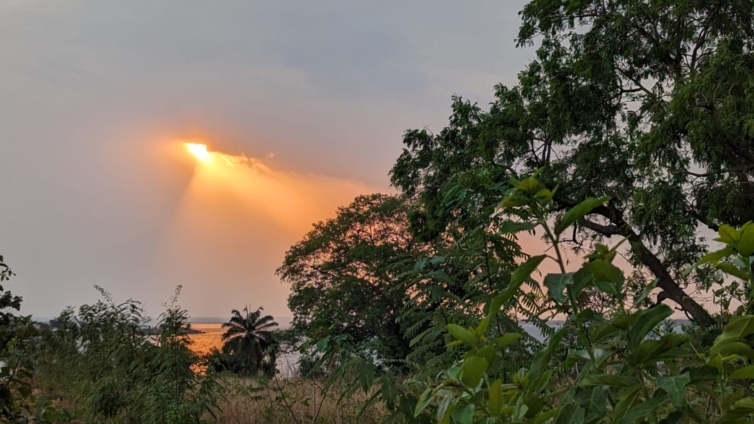Climate finance is a major focus for this year's Conference of Parties (COP29) in Azerbaijan, which is why Allied for Climate Transformation by 2025 (ACT2025) advocates for developed countries, including members of the G7 and G20 that emit significant greenhouse gases, to prioritise intentional climate financing.
ACT2025 also advocates for these countries to demonstrate leadership as they account for 75% of total emissions and must assume responsibility to enact emission reductions.
As countries vulnerable to climate change confront escalating impacts, the slow progress of international politics starkly contrasts with the urgency of the crisis.
While last year's COP28 yielded some constructive results, such as the establishment of the Loss and Damage Fund and a comprehensive Global Stocktake, emphasising the imperative to shift from fossil fuels, outcomes concerning climate finance and support were generally weak and ambiguous.
During a Zoom interview with JoyNews' Mahmud Mohammed-Nurudeen, representatives Alejandra Lepoz Carbajal and Gabrielle Swaby from ACT2025 emphasised that developed countries should reassess their Nationally Determined Contributions (NDCs) to make them more ambitious, robust, and enhanced to support the most affected developing countries.
“There is a specific call to G7 and G20 countries to ensure that by early this year they have put forward more ambitious, revised and enhanced NDCs to their national climate plans,” Gabrielle said.
She stressed that countries should not solely offer financial assistance but also engage in capacity building and facilitate technological transfer and development, ensuring a continuous and collaborative effort.
Alejandra corroborated what Gabrielle said saying their call was for G7 countries to enhance their emission ambition, but also the 100 billion climate finance is low and must be looked at.
“If we want to drive something in developing countries, the G7 has to commit to doing something ambitious,” Alejandra said.
What is the $100 billion U.S. climate finance pledge?
At the 15th Conference of Parties (COP15) in 2009, developed countries committed to "mobilising" $100 billion annually by 2020 for climate action in developing countries.
Initially proposed by former UK Prime Minister Gordon Brown a few months before COP15, it aimed to establish a "new international partnership on public finance for climate change" founded on principles of equity, additionality, shared governance, and predictability.
Upon arrival at COP15, U.S. Secretary of State Hillary Clinton announced the pledge, specifying that the funds would be allocated to the "poorest and most vulnerable" countries with a significant emphasis on adaptation and forestry.
The figure was formalised during COP16 in Cancun the following year. At the same conference, the Green Climate Fund (GCF) was established to serve as a primary delivery mechanism.
The Paris Agreement, formed during COP21 in 2015, reiterated the $100 billion commitment, with signatories deciding that this amount should be provided annually between 2020 and 2025.
The agreement outlines that this target should be met through contributions from various sources including private, public, multilateral, and other channels, with 50 per cent allocated to mitigation and 50 per cent to adaptation efforts. Since then, this commitment has become a yardstick for assessing the overall dedication of developed nations to combating climate change.
Despite endeavours dating back to 2013, there's no universally accepted definition of climate finance agreed upon by multiple parties. Negotiators at the UN Framework Convention on Climate Change (UNFCCC) have yet to reach a consensus on how to measure countries' financial pledges.
Developing countries require trillions for climate needs
Alejandro says the needs of developing countries are in trillions of dollars, saying a 100 million dollar goal is no longer fit for purpose in the current state of climate crisis. Alejandro contended that developing countries require trillions of dollars to address their needs, asserting that a $100 billion target is inadequate given the severity of the current climate crisis.
She noted that public financing for climate change is constrained by competing priorities, suggesting there's a limit to how much can be allocated.
“There is the need to mobilise other sources of funding to developing countries.”
Alejandra and Gabrielle emphasised the need to address inequities in climate financing, calling for action to rectify this issue at COP29.
“We actually have reached about trillion dollars which is just one per cent of the global economic output on climate finance but most of it stays in developed countries.”
Gabrielle explained that ACT2025 is implementing a new approach by establishing forums where countries can unite, speaking with a unified voice to foster cooperation and hold developed nations accountable to their pledges.
Latest Stories
-
Center for Learning and Childhood Development Director Dr Kwame Sakyi honoured at Ghana Philanthropy Awards
2 hours -
Asantehene receives 28 looted artefacts
3 hours -
CAF WCL 2024: Ghana’s Thelma Baffour wins title with TP Mazembe
4 hours -
Benjamin Boakye slams politicisation of energy sector issues and ECG’s inefficiencies
4 hours -
Erastus Asare Donkor and Dr Neta Parsram win big at 10th Mining Industry Awards
4 hours -
Government is “suppressing information” about power sector challenges – IES Director
4 hours -
Majority of our debts caused by forex shortfall – ECG Boss
5 hours -
Pan-African Savings and Loans supports Ghana Blind Union with boreholes
5 hours -
Bole-Bamboi MP Yussif Sulemana donates to artisans and Bole SHS
6 hours -
Top up your credit to avoid potential disruption – ECG to Nuri meter customers
6 hours -
Dutch & Co wins 2024 Entrepreneur of the Year Award
6 hours -
We’ll cut down imports and boost consumption of local rice and other products – Mahama
8 hours -
Prof Opoku-Agyemang donates to Tamale orphanage to mark her birthday
9 hours -
Don’t call re-painted old schools brand new infrastructure – Prof Opoku-Agyemang tells gov’t
10 hours -
Sunon Asogli plant will be back on stream in a few weeks – ECG
10 hours

